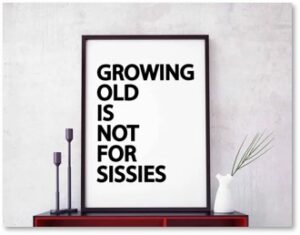Getting old is easy but getting old is also hard. Contradictions abound. I see them in news items almost every day. Sometimes conflicting reports appear in the same news outlet on the same day. Few people seem to notice the dissonance.
Take work, for example.
The Wage Gap
 On the one hand, scientists are now predicting that we will one day receive one injection a decade that will give us another 10 years of good health and mobility. (Note to science: I’m ready for my first dose.)
On the one hand, scientists are now predicting that we will one day receive one injection a decade that will give us another 10 years of good health and mobility. (Note to science: I’m ready for my first dose.)
That will give us much more leisure time when we’re retired, but we might not have any money with which to enjoy it. Healthcare will extend our lives but what will we do with all those extra years? And how will we pay for them?
Because, on the other hand, Republicans want to raise the qualification age for Social Security and Medicare to 70. Why should that be a problem? After all, a person who receives a miraculous injection and has 10 good years ahead of him/her, can certainly work until 70 or more before tapping a government support system.
Aging Out the Work Force
Except that companies typically lay off their older, more experienced workers to avoid paying them higher salaries. The younger, cheaper people hired in their place lack experience and, worse, have no one to teach them what they need to know.
 The high-tech industry begins aging-out its workers at 50—and sometimes younger. They have absorbed the magical thinking that young people have higher levels of achievement and creativity. A high-tech worker who can make it past 60 is beating the odds.
The high-tech industry begins aging-out its workers at 50—and sometimes younger. They have absorbed the magical thinking that young people have higher levels of achievement and creativity. A high-tech worker who can make it past 60 is beating the odds.
Financial planners used to call the years between 40 and 65 the highest achieving years when workers would earn and save the money they needed for retirement. Now those golden years have shrunk from 25 to 10 and sometimes much less. Sometimes those high-earning years never happen at all.
You can have time or money, it seems, but not both. And certainly not at the same time.
The Graying of Adolescence
See what I mean? A gap of 20 or even 30 years without a good salary and benefits forces people to take whatever is available if they want to live comfortably. We saw this before the pandemic hit with older workers doing the jobs teenagers once held: supermarket cashiers, working concession stands, flipping burgers, etc.
What were the adolescents doing instead? They were doing unpaid internships (AKA professional slavery) to gain experience they once acquired at entry-level jobs. Those part-time jobs once allowed young people to save for college. But now they were working for free and spending money on commuting and lunches instead of saving.
The Worker Shortage
What’s that, you say? After the pandemic, companies can’t find enough workers? Very true. But, as we are currently seeing, high-tech firms have embraced layoffs as their first tool for saving money when earnings don’t meet expectations. They hired big after the pandemic but the major technology firms have eliminated 159,786 jobs in 2023 alone.
 Those newly unemployed workers, heavily concentrated in certain areas, are struggling to find new jobs in the face of heavy competition. Mostly young people, they are neither saving for an uncertain future nor paying off their college loans.
Those newly unemployed workers, heavily concentrated in certain areas, are struggling to find new jobs in the face of heavy competition. Mostly young people, they are neither saving for an uncertain future nor paying off their college loans.
Guess who is: their parents. Those same old folks who have aged out of their own jobs often pay the loans they co-signed for their kids. That burdens them with another financial load they will probably never pay off at the same time they bring home less money. It certainly won’t get them through a longer work gap before they can collect Social Security and Medicare.
Time or Money
 And so it goes: around and around like a manic carousel. You can have time or money but not both.
And so it goes: around and around like a manic carousel. You can have time or money but not both.
Some lucky people can take advantage of the post-pandemic hiring frenzy to improve their careers and financial situations. Others have leveraged the new corporate willingness to let employees work from home and to move to cheaper locations. There, they can own homes and enjoy a higher standard of living. Good for them.
Oh, and one more thing: because Social Security benefits are tied to what you earn and you will be earning less for a longer amount of time, the retirement income for underemployed workers will be less as well. Time or money: take your pick.
